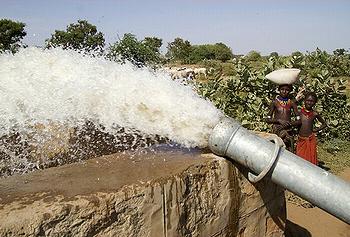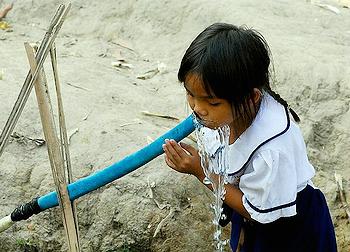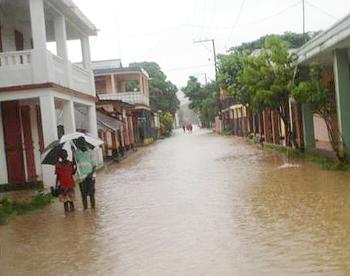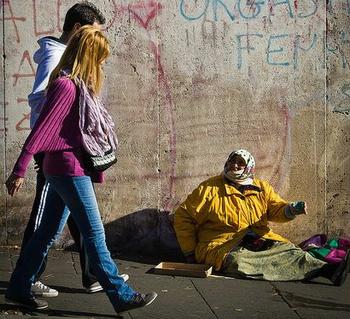 |
| Reviews and Templates for Expression We |
'Water Is Life and Sanitation is Dignity'
"Over the coming decades, feeding a growing global population and ensuring food and nutrition security for all will depend on increasing food production. This, in turn, means ensuring the sustainable use of our most critical finite source - water," said Secretary-General Ban Ki-moon in his message marking World Water Day.
 |
Water pumped from the Omo River surges through a pipe and into irrigation channels constructed by Awegga community, with support from Agri Service Ethiopia. (Photo by Christian Aid Images) |
The theme of this year's observance is water and food security. Today, nearly one billion people suffer from hunger and some 800 million still lack a safe supply of fresh water.
In his message, Ban emphasized that guaranteeing food and water for all will require countries' full engagement.
"It will require policies that promote water rights for all, stronger regulatory capacity and gender equality,"Ban said. "Investments in water infrastructure, rural development and water resource management will be essential."
But UN water and sanitation expert Catarina de Albuquerque today urged countries to recognize the right to water and sanitation for all during the Rio+20 UN Conference on Sustainable Development taking place in Rio de Janeiro in June.
In July 2010, 122 countries formally acknowledged the "right to water" in a resolution of the UN General Assembly. In September, 2010, the UN Human Rights Council adopted a resolution recognizing that the human right to water and sanitation are a part of the right to an adequate standard of living.
 |
A girl quenches her thirst in Hanoi, Vietnam, 2008 (Photo by motnghinnamthanglong_minhngocphoto) |
Albuquerque said that countries cannot go back on their decision to support this right, as Canada and the United Kingdom are trying to do.
"Some states, including Canada and the United Kingdom, are apparently proposing the removal of an explicit reference to the right to water and sanitation for all from the first draft of the Rio+20 United Nations Conference on Sustainable Development outcome document," Albuquerque warned. "We should be marking World Water Day with progress, not debating semantics and certainly not back-tracking on these issues."
In honor of World Water Day, the UN Food and Agriculture Organization is hosting a series of events at its headquarters in Rome - discussions on improving water management, reducing food and water waste, and building up communities' resilience to climate change.
The UN Environment Programme is among the 15 partners involved in a sustainable development initiative in Haiti with a 20-year vision focused on achieving large-scale lasting change in the island nation's South Department - the Côte Sud Initiative.
As Haiti's South Department is mountainous and its steep slopes are severely deforested, there is little protection from heavy rains which flow into the many rivers, causing flash flooding and sweeping soil and sediment, crops, livelihoods and personal property into the sea.
 |
Too much water can be as difficult as too little. The Haitian town of Port-à-Piment is situated where two rivers meet the sea and is often at risk of flooding, October 2011. (Photo courtesy Haiti Regeneration Initiative) |
Existing baseline data on the rivers and groundwater of Côte Sud is too limited to inform plans and investments in water management, so Côte Sud Initiative partners are introducing continuous field data collection to improve understanding and flood risk reduction.
With Haiti's rainy season looming, researchers from the Earth Institute have led the installation of climate monitoring stations and rain gauges, piloted a mobile water quality testing laboratory, and installed new river monitoring stations in the larger regional rivers. The stations transmit real-time data to the Internet via satellite.
With this data, the Côte Sud Initiative team can determine how quickly a storm in the mountains will have an impact on downstream communities in flood-prone areas near sea level or close to eroding banks.
Speaking from Port Salut on World Water Day, UNEP's Haiti Country Programme Manager Antonio Perera said the new monitoring system, a first for the region, is vitally important in the development of accurate early warning systems for watershed residents.
Perera said, "The monitoring equipment allows the pulse of water to be measured as it passes monitoring points and should contribute to protecting livelihoods, public safety and health."
Improvements to clean water access are needed in developed countries as well.
A UN report on unequal water access in Europe issued March 13 finds rural communities and marginalized groups are still not getting clean water.
Left behind in the pan-European region are 12 percent of population, nearly 110 million people who do not have access to safe drinking water. The World Health Organization estimates that 13,000 children under the age of 14 die every year in the region from water-related diarrhea, mostly in Eastern Europe and Central Asia.
 |
Homeless woman at The Vatican in Rome, Italy, begs for help. (Photo by Daniel Pockett) |
Produced by the UN Economic Commission for Europe, the report provides guidance on how to address water access disparities, and showcases successful policies that have been implemented by governments, water operators and civil society.
"No one left behind: Good practices to ensure equitable access to water and sanitation" finds that access to improved water and sanitation solutions in rural areas in the pan-European region is 10 percent lower than for urban areas, and suggests putting investment programs in place to help reduce this gap.
The report says social inclusion policies are needed to be able to provide water access to marginalized and vulnerable groups such as the homeless, disabled, sick, or those living in unsanitary housing, who are often unable to get access to safe drinking water.
Increasing water prices are singled out as a key factor for unequal water access in European Union countries, with the report highlighting how tariffs and social protection measures can help consumers cover the costs.
UNECE Deputy Executive Secretary Andrey Vasilyev, who presented the report at the World Water Forum in Marseille, said "political will and strong water governance" are needed to tackle these disparities.
Vasilyev, together with Xavier Bertrand, Minister of Labour, Employment and Health of France, which funded the report; and Zsuzsanna Jakab, regional director for Europe, World Health Organization, wrote in their Foreword to the report, "As water is life and sanitation is dignity, France is honoured to lead and to continue leading activities to promote equitable access to water and sanitation for all members of the population..."
|
|
|
|
Copyright 2011 Energy and Technical Services Ltd. All Rights Reserved. Energyts.com |